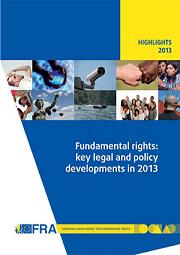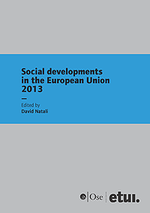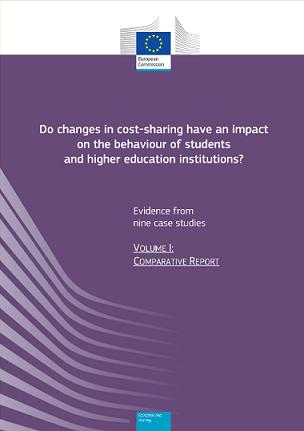Jaroszewicz, Μ. (2014) “Can we expect a rise in migration from Eastern Europe?“, EU Observer, 15 Ιουλίου. Research indicates that the inflow of migrants from Ukraine, Belarus and Moldova – even after visa liberalisation – will be modest. The Polish Centre for Eastern Studies, altogether with seven other research institutions from Central and Eastern Europe, has recently concluded research aimed at forecasting possible future migration from eastern Europe to …Read More
Fundamental rights: key legal and policy developments in 2013. Highlights 2013
FRA (2014) “Fundamental rights: key legal and policy developments in 2013. Highlights 2013“, European Union Agency for Fundamental Rights, Ιούλιος. The EU and its Member States took a variety of important steps in 2013 to protect and promote fundamental rights by assuming new international commitments, revamping legislation and pursuing innovative policies on the ground. Yet, fundamental rights violations seized the spotlight with distressing frequency: would‑be migrants drowning off the …Read More
Social developments report 2013: blueprint for a new European social agenda
Natali, D. (2014) “Social developments report 2013: blueprint for a new European social agenda“, European Social Observatory (ESO), European Trade Union Institute (ETUI), 03 Ιουλίου. Given the need to jumpstart growth and tackle Europe’s unemployment and investment crisis, this year’s edition of Social developments in the European Union advocates a complete reorientation of the EU’s socio-economic policies. The fifteenth annual report on the state of social Europe, written by …Read More
Bringing Europe closer to the people
Schultz, M. (2014) “Bringing Europe closer to the people“, European Parliament: Articles, 10 Ιουλίου. “Isn’t it rather that Europe turns away from the people?” This question from a Danish woman during a debate on why people turn away from Europe got Martin Schulz thinking for months. “This sentence really touched me,” he told us a few months later in an interview. “Maybe it isn’t true, but we have to …Read More
Why We Need More Social Europe
Crouch, C. (2014) “Why We Need More Social Europe“, Social Europe Journal, 04 Ιουλίου. Globalization makes international collaboration more urgent; but it also makes it less likely to happen. Marketization requires social policy, not only to combat the negative effects of markets, but also to support the market with things it cannot provide for itself; but marketization and social policy are usually seen as opposed projects. For Europeans, confronting …Read More
On the transnational social question: How social inequalities are reproduced in Europe
Faist, Τ. (2014) “On the transnational social question: How social inequalities are reproduced in Europe“, Journal of European Social Policy, Vol. 24, No. 3, σσ. 207-222, Ιούλιος. What are the consequences of cross-border employment and social protection practices for social inequalities in Europe? The transnational social question is a multifaceted one: it is linked not only to inequalities generated by heterogeneities such as class, gender, ethnicity, legal status and …Read More
Income Inequality and Youth Unemployment
Esposito, M. & Tse, T. (2014) “Income Inequality and Youth Unemployment“, Project Syndicate, 25 Ιουνίου. With Thomas Picketty’s controversial book Capital in the Twenty-First Century topping several bestseller lists, income inequality – which has been on the rise since the 1970s – is once again capturing global attention. Debate surrounding the subject has covered many of the trend’s repercussions, including decreased social cohesion, growing slums, exploitation of labor, and …Read More
Social Europe In A Climate Of Austerity, The Need For Social Dialogue To Improve Distribution
Pissarides, C. (2014) “Social Europe In A Climate Of Austerity, The Need For Social Dialogue To Improve Distribution“, Social Europe Journal, 23 Ιουνίου. Eurofound stands for Improvement of Living and Working Conditions through social dialogue. Currently, in the midst of high unemployment and increasing inequality, living and working conditions for ordinary people are worse than in 2007. But recession is not the only problem. Even when countries are recovering, …Read More
Do changes in cost-sharing have an impact on the behaviour of students and higher education institutions?
European Commission (2014) “Do changes in cost-sharing have an impact on the behaviour of students and higher education institutions?“, Cost-sharing Impact Study, 23 Ιουνίου. This report analyses the effects of different models of cost-sharing in higher education (the split between public and private contributions to higher education funding) on students and higher education institutions. The study examines trends in participation and completion in third-level education, as well as factors …Read More
The Tragedy of the Euro
Bagus, P. (2010) The Tragedy of the Euro, Mises Institute. The current sovereign debt crisis is the direct result of credit expansion by the European banking system. In the early 2000s, credit was expanded especially in the periphery of the European Monetary Union such as in Ireland, Greece, Portugal, and Spain. Interest rates were reduced substantially by credit expansion coupled with a fall both in inflationary expectations and risk …Read More







